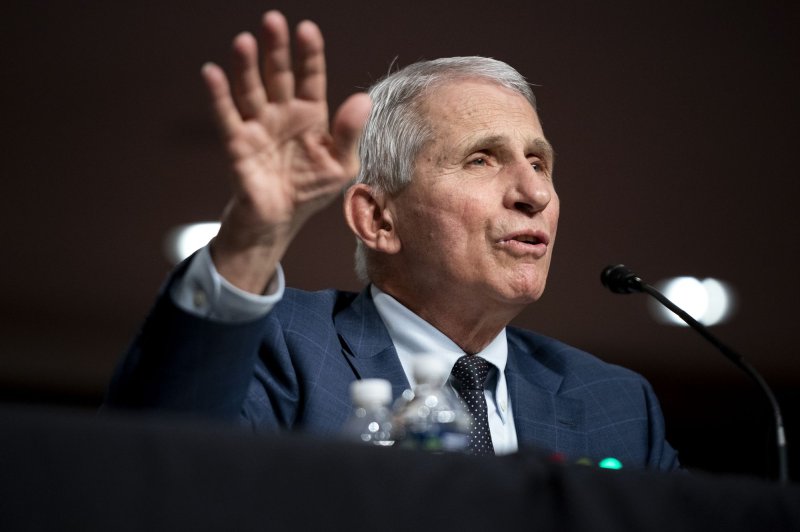1 of 5 | Dr. Anthony Fauci said Sunday he is as "confident as you can be" that the United States will see Omicron COVID-19 cases peak in mid-February, but warned that the virus has "surprised us in the past." Pool photo by Greg Nash/UPI |
License Photo
Jan. 23 (UPI) -- Dr. Anthony Fauci on Sunday said he anticipated that the surge of COVID-19 cases brought on by the Omicron variant will peak by mid-February.
Fauci, director of the National Institute of Allergy and Infectious Diseases, told ABC News' This Week that he was "as confident as you can be" that most states would see the peak of their Omicron infections within the next month, adding, however, that the virus has "surprised us in the past."
"Things are looking good. We don't want to get overconfident, but they look like they're going in the right direction right now," he said.
Through, the seven-day moving average of daily new cases in the United States was down 10% to 716,829 from 796,828 a week earlier, according to the Centers for Disease Control and Prevention. The seven-day average for new deaths rose 9.5% from 1,802 to 1,974.
A total of 152,919 hospital beds at 5,994 hospitals nationwide were in use for COVID-19 patients representing 20.19% of all inpatient beds, according to data from the Department of Health and Human Services. Overall 78.56% of inpatient beds ay 6,116 reporting hospitals throughout the nation were in use.
It hit a record 160,113 Thursday,
Since the start of the pandemic, the United States has reported world-leading totals of 70,521,942 infections and 866,124 deaths related to the virus, according to data gathered by Johns Hopkins University.
Fauci said some states in the Northeast and upper midwest have already seen cases peak and decline "rather sharply" with New York, an early Omicron hotspot, reporting a daily average of 30,042 new cases of Saturday, a 58% decrease over 14 days, according to data from The New York Times. Sunday's figure was 19,186.
However, North Dakota has seen its daily case average rise to 2,286, nearly four times higher than the start of January and Utah has reported record hospitalizations with a daily average of 10,808 new cases, up more than tenfold from the start of the month.
"There may be a bit more pain and suffering with hospitalizations in those areas of the country that have not been fully vaccinated or have not gotten boosters," Fauci said.
As of Saturday 80.2% of the eligible population in the United States, including people aged five and older, had received at least one dose of a COVID-19 vaccine, according to CDC data.
Overall, 250,568,431 people, or 75.5% of the total population, have received at least one shot while 210,229,586 people, or 63.3% have completed their vaccine regimen. Among those who have received a full vaccine regimen, 39.7% have received an additional booster dose.
On Friday, CDC Director Dr. Rochelle Walensky said the agency would not change its definition of "fully vaccinated" -- currently defined as having one dose of the Johnson & Johnson vaccine or two doses of the Pfizer or Moderna vaccines -- but would seek to provide clarity to ensure people are "up to date" on their vaccinations.
"If you are eligible for a booster and you haven't gotten it, you're not up to date and you need to get your booster in order to be up to date," Walensky said.
"What we really are working to do is pivot the language to make sure everybody is as up to date with their COVID-19 vaccines as they personally could be."
Fauci said it was not yet known whether another booster shot will be recommended as scientists work to determine how much protection the initial booster shots provide, but said he was hopeful "that the third boost will give a much greater durability of protection."
"We may need to boost again, but before we make that decision, we want to determine what the durability is," he said.















